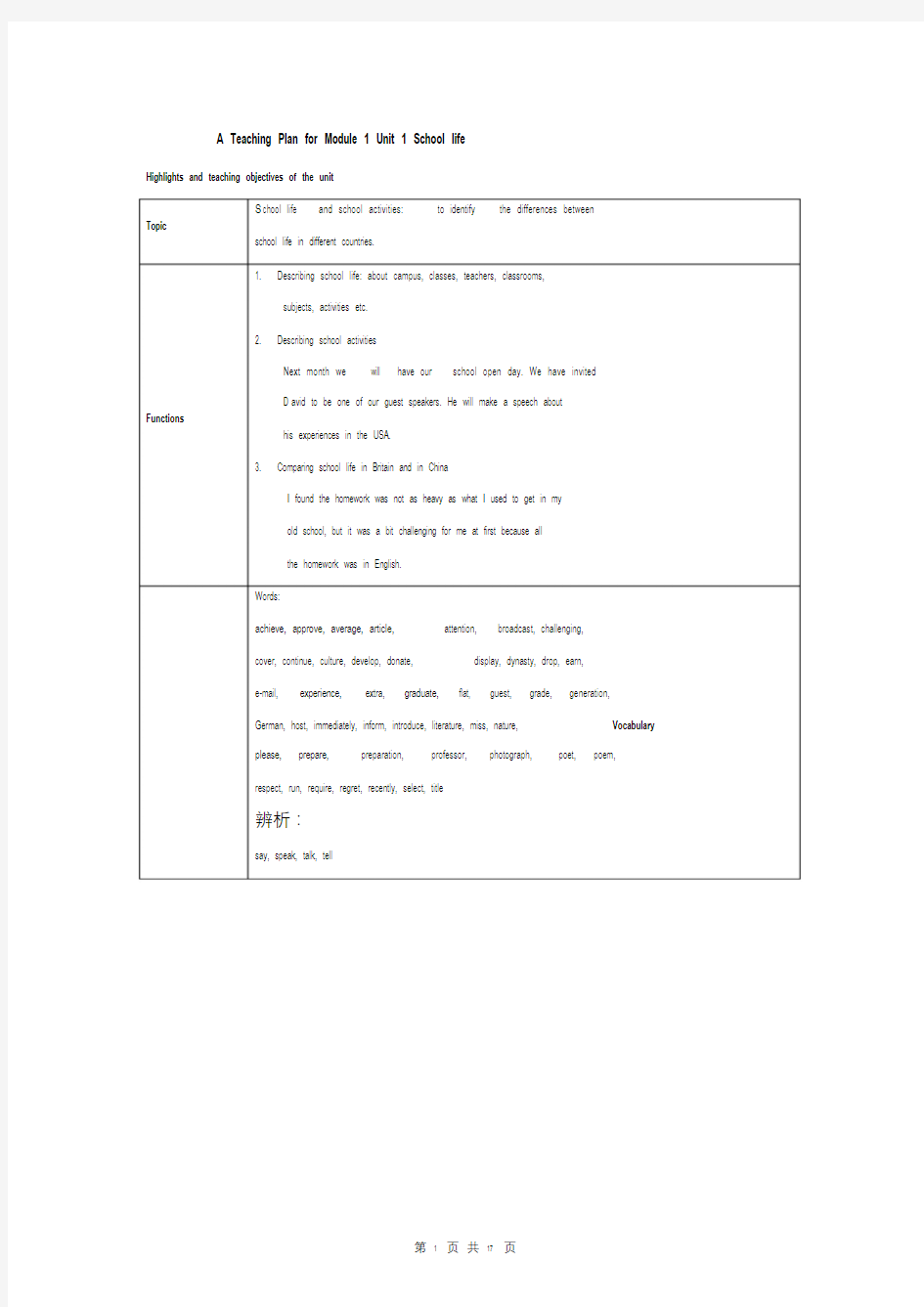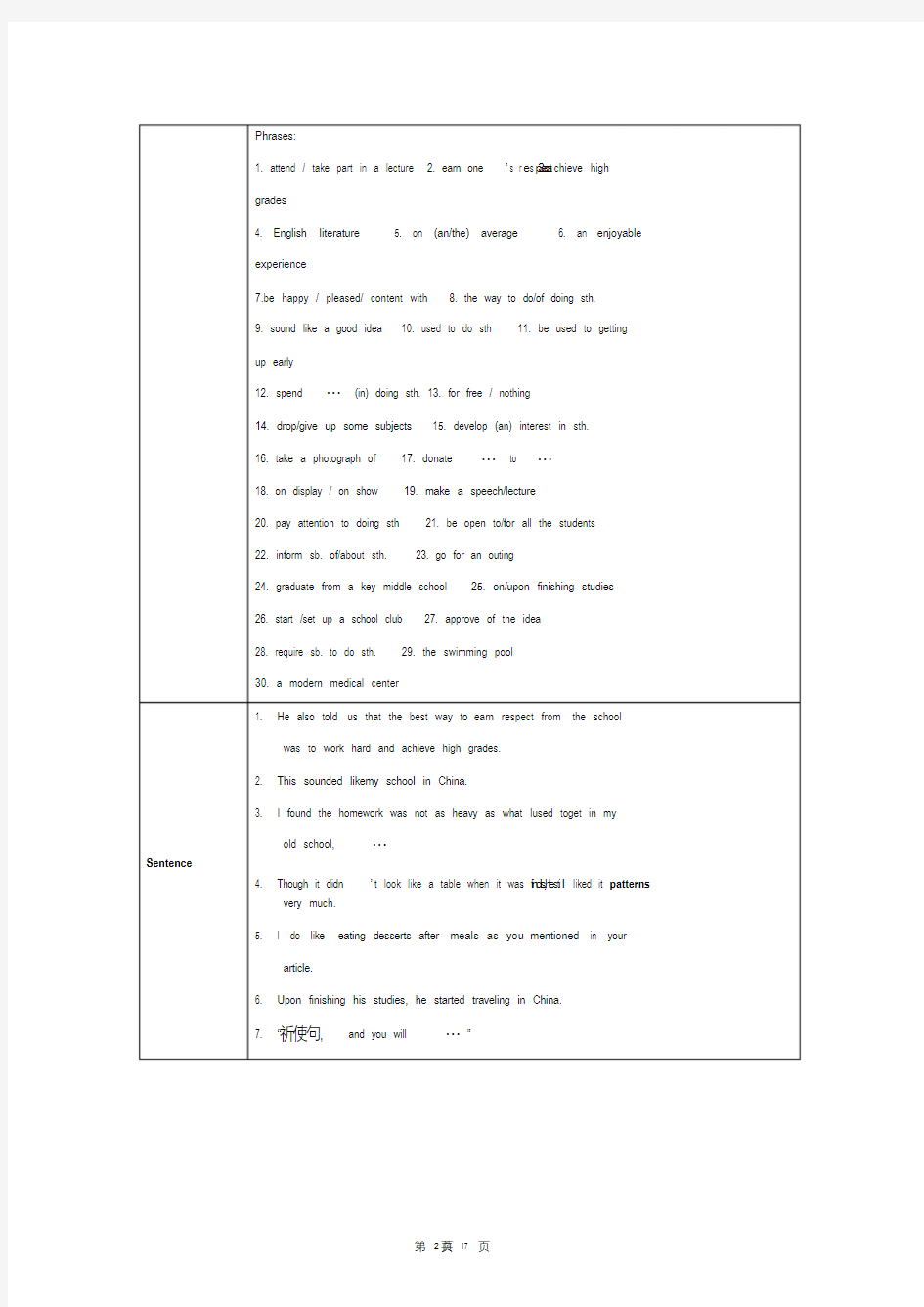

A Teaching Plan for Module 1 Unit 1 School life Highlights and teaching objectives of the unit
Topic S chool life and school activities: to identify the differences between school life in different countries.
1. Describing school life: about campus, classes, teachers, classrooms,
subjects, activities etc.
2. Describing school activities
Next month we will have our school open day. We have invited
Functions
D avid to be one of our guest speakers. He will make a speech about
his experiences in the USA.
3. Comparing school life in Britain and in China
I found the homework was not as heavy as what I used to get in my
old school, but it was a bit challenging for me at first because all
the homework was in English.
Words:
achieve, approve, average, article, attention, broadcast, challenging, cover, continue, culture, develop, donate, display, dynasty, drop, earn,
e-mail, experience, extra, graduate, flat, guest, grade, generation, German, host, immediately, inform, introduce, literature, miss, nature, Vocabulary please, prepare, preparation, professor, photograph, poet, poem, respect, run, require, regret, recently, select, title
辨析:
say, speak, talk, tell
第 1 页共17 页
Phrases:
1. attend / take part in a lecture
2. earn one ’s r e s p3e.c a t chieve high
grades
4. English literature
5. on (an/the) average
6. an enjoyable
experience
7.be happy / pleased/ content with 8. the way to do/of doing sth.
9. sound like a good idea 10. used to do sth 11. be used to getting
up early
12. spend ?(in) doing sth. 13. for free / nothing
14. drop/give up some subjects 15. develop (an) interest in sth.
16. take a photograph of 17. donate ?to ?
18. on display / on show 19. make a speech/lecture
20. pay attention to doing sth 21. be open to/for all the students
22. inform sb. of/about sth. 23. go for an outing
24. graduate from a key middle school 25. on/upon finishing studies
26. start /set up a school club 27. approve of the idea
28. require sb. to do sth. 29. the swimming pool
30. a modern medical center
1. He also told us that the best way to earn respect from the school
was to work hard and achieve high grades.
2. This sounded likemy school in China.
3. I found the homework was not as heavy as what Iused toget in my
old school, ?
Sentence
4. Though it didn ’t look like a table when it was f i n d i s,h I e sti l liked it patterns
very much.
5. I do like eating desserts after meals as you mentioned in your
article.
6. Upon finishing his studies, he started traveling in China.
7. “祈使句,and you will ?”
第2页共17 页
1. Introduction to attributive clauses
She was the teacher who taught us English literature.
2. Relative pronouns:that, which, who, whom a nd w hose Grammar All my classmates enjoyed the cake that/which I made.
The girl (that/who/whom) you have just seen is very good at
English.
I sat nest to a girl whose name was Diane.
1. Reading: read a magazine article about school life in the UK and
Skills and strategies
two other articles about school clubs
2. Listening: listen to a headmaster talking about school activities
3. Speaking: talk about daily school life and report their activities
4. Writing: Write a notice about school activities
1. School life in the UK
Culture 2. After-school activities in the UK
3. School activities and school clubs
Teaching methods:
1. Discussions in pairs or in groups
2. Task-based in class activities.
3. Explanations of some language points and grammar rules.
Period 1 Vocabulary
Teaching aim:
To learn the new words and expressions in this unit.
Teaching Procedures:
Step 1 Reading
Begin the first lesson like this: Good morning, everyone. Nice to see you. Now
the new term has begun and you have entered a new period in your studies. I am very
happy to have all of you in my class and I ’m sure we will be good friends and we will succeed, because you are such good students and to tell you the truth, I ’m a ver teacher, too. First, let me introduce myself. My name is Wang Qingguang ( 王庆光).
So let ’wsork hard together to realize our common goal, that is, all of you will be
admitted into key universities three years later. But as the saying goes, “to cle whole world, you must tidy your own room first. ”So now let ’l e s s s g o e n t,down to our
第 3 页共17 页
Unit 1. First, let ’s l e a t r h n e new words. Please turn to page 68. I ’l g l i ve you a few minutes; please practice reading them aloud. Then I ’l y a o s u k t o s o s m t a e n d o f u p
and read them. Start!
Ask a few students to stand up and read the new words. Correct any mistakes in pronunciation.
Step 2 Exercises
Do the vocabulary exercises in the printing material
Homework
1. Read aloud the new words in Unit 1 and finish the vocabulary exercises o n the
learning plan.
2. Preview the reading passage.
Period 2 Welcome to the unit
Teaching aims:
1. To revise the new words by doing some exercises.
2. To introduce and develop the theme of school life, especially to get the students to
know of differences between high school life and junior school life as well as to
identify the differences between school life in different countries.
3. To develop the students ’listening and speaking abilities by talking about the four
pictures on page 1. and their new life and hope in the new school.
Teaching Procedures:
Step 1 Revision
Revise the vocabulary by doing the exercises on the learning plan.
Step 2 Comparison and discussion
Page 1. High school is a time of discovery, learning and hard work! Look at the pictures below. They show some parts of high school life in the UK. Discuss the following questions with your partner.
1. Do you know of any differences between the lives of Chinese and British high school students? (You may refer to the four pictures above while discussing this question.)
2. What kind of school activities do you enjoy?
3. What is your dream school life like?
Sample answers:
1.
第 4 页共17 页
aspects In the UK In China
In the UK, we can see
Campus and buildings
h uge campus and low-rise
buildings. (The school
yard is very big, but the
classroom buildings are
rather low, just like
houses.)
It is the biggest difference
Schools in China usually have a large
campus, too, so that it will make sure
all the students have enough space to
study and play in. But most school
buildings are taller, at least three or
four storeys.
from schools in China
In the UK, there are rows
Whether to have
of lockers by/outside the While in China, students have to lockers (n. small
classrooms for students to bring their schoolbags t o school and cupboard 寄物
put their stationary, books, then take them all back home after 柜) for every exercise-books and other school. Most schools in China do not
belongings/articles / have lockers in the classroom.
student
things.
Number of students in each class I n the UK, there are fewer
students in a class, no
more than 30 per class.
W hile in China we have about 40, 50
or even 60 students in each class,
which makes both teaching and
learning more difficult.
In the UK, students have a It is similar in China. Generally
close relationship with speaking, students and teachers a re
their teachers. They feel at like friends. They have also
ease and comfortable with established a good relationship with
them. In most cases, each other. Of course, there are some
Relation with teachers treat students as teachers who are too hard on their
their teachers their equals. In the class, students, f or example, some teachers
there will be more ask their students to copy their
discussions, and students mistakes for one thousand times;
are encouraged to Worse still, some teacherseven beat
participate in them. their students in the face, and so on, I
don’tthink it is good. Teachersand
第 5 页共17 页